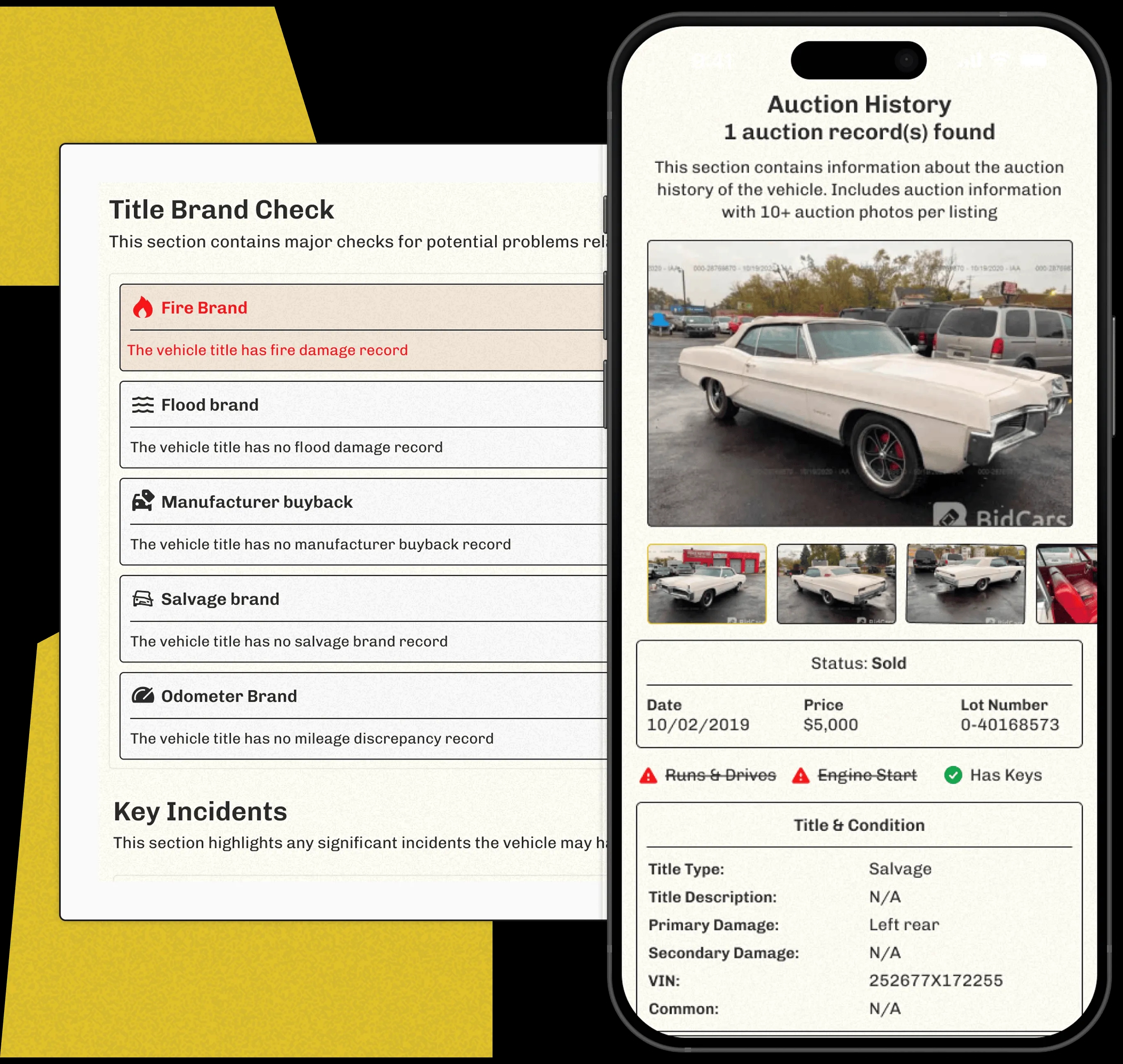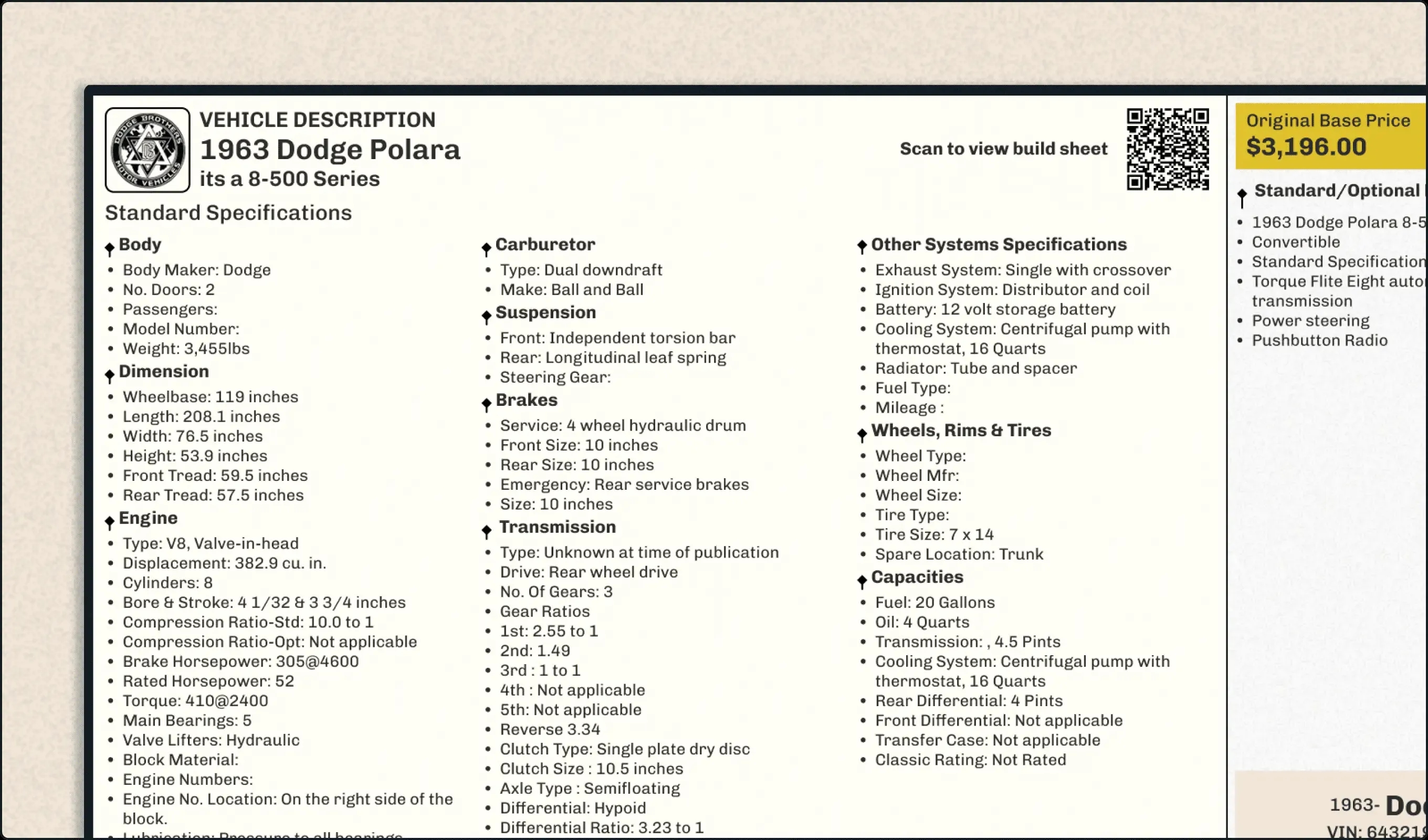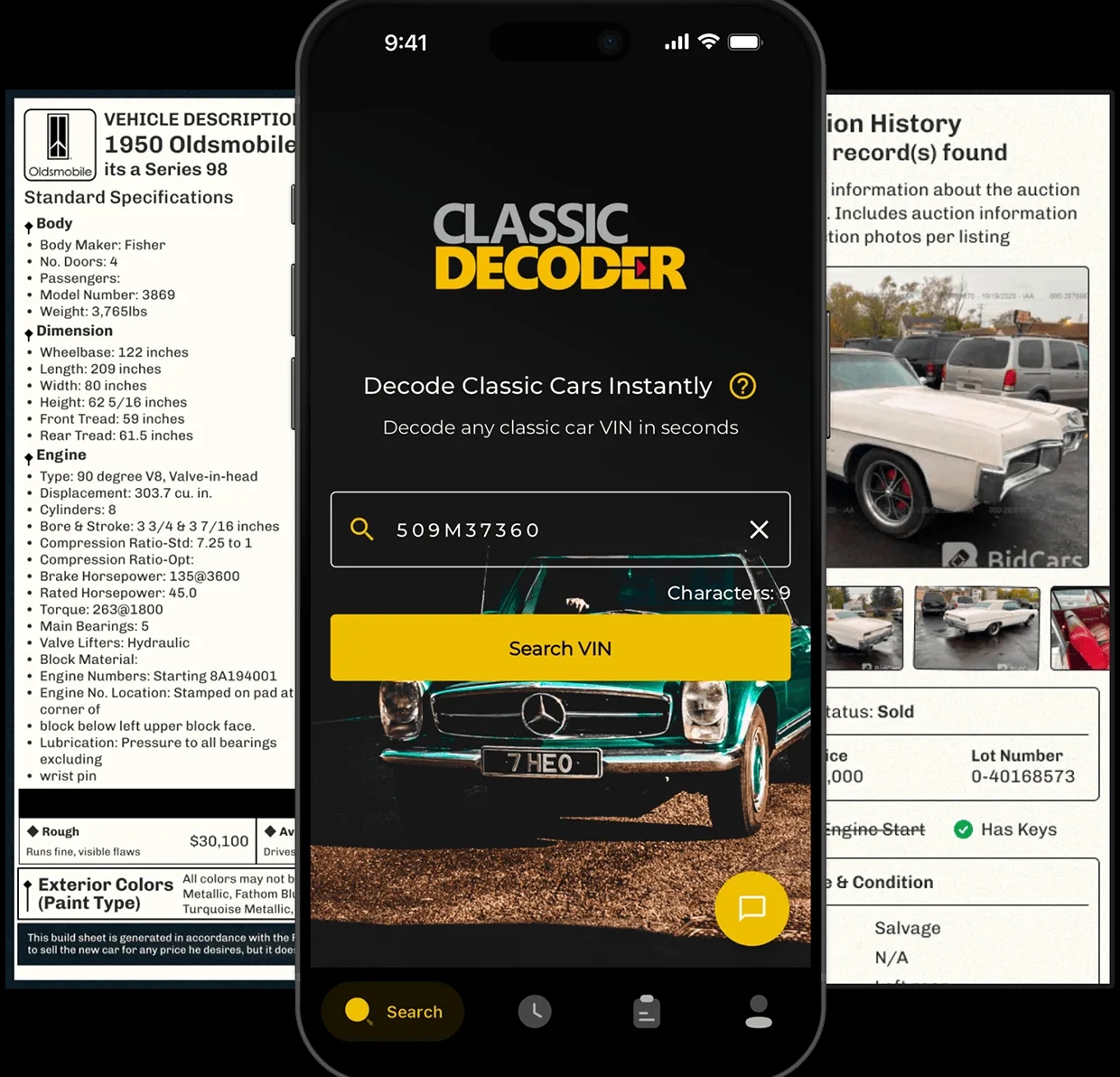1972 Plymouth Cuda
The '72 Cuda: a muscle car legend! Think aggressive lines, that iconic shark-nose grille, and raw power. A cultural icon of the era, its history's packed with high-performance and Hollywood cameos. Basically, pure 70s cool, instantly recognizable and seriously desirable.
Decode Classic VINs to Get Vehicle History Report and Build Sheet
Unveiling the Timeless Charm of the 1972 Plymouth Cuda
There's something utterly mystical about the classic 1972 Plymouth Cuda. It's like stepping into a time machine and landing straight into the heart of the muscle car era—an age where raw power and audacious designs took the front seat. But, before we get all sentimental, let's delve into what makes the '72 Cuda a perennial favorite amongst classic car aficionados.

1972 Plymouth Cuda Models:
Select the vehicle's model to see the correct data for it.
How Much is Plymouth Cuda Worth?
Original MSRP :$2,953.00
Outstanding
Clean
Average
Rough
1972 Plymouth Cuda Specs
Interested in buying a classic car or selling one?
Access detailed history reports for classic vehicles from hundreds of manufacturers.
- Accident Records
- Theft Records
- Loan & Lien Information
- Auction Information
- Salvage Information and more

History of the 1972 Plymouth Cuda
Picture this: It's the early '70s, and the Cuda rolls onto the scene, flaunting its iconic design. This model marked the end of the first-generation Barracudas, and oh boy, did it leave a mark! With economic challenges and changing consumer tastes, the Cuda became a blend of style and performance, a direct response to new regulations and the fuel efficiency dilemma. Its vibrant appearances in media only boosted its cultural significance, sealing its fate as a true American classic.
Learn more about a classic car: Get Build Sheet by VIN.
Access reproduced classic build sheets to learn more about your classic vehicle details.
- Standard Specifications
- Original Base Price
- Standard & Optional Equipment
- Exterior & Interior Colors
- VIN ID & Location description

Detailed Specifications of the 1972 Plymouth Cuda
Under the hood, the 1972 Cuda promised thrill-seeking riders a powerful experience. Some may argue the handling wasn't its finest attribute—hey, it's not exactly a gazelle among muscle cars—but its V8 engine meant business on the straightaway. With acceleration times that would make any speed enthusiast's heart race, it's no wonder the Cuda became a drag racing favorite.
Popular Figures Who Own the 1972 Plymouth Cuda
Owning a Cuda is akin to holding a piece of history in your garage. Let's talk about some known personalities who've made this car part of their collection.
Tim "T.J." Mesmer
You might not find his name in every history book, but Tim "T.J." Mesmer is a legend in the Cuda community. Not just any Cuda, Tim owns a pristine 1970 Plymouth Hemi 'Cuda Convertible, an award-winning beauty that turns heads wherever it goes. Mesmer's dedication to maintaining the car's original allure showcases the passion that such classic cars ignite.
Pop Culture Icons
The Cuda didn't just sit idle in personal collections; it strutted its stuff on television screens everywhere. From shows like Mannix to The Brady Bunch, the Cuda became a visual representation of the muscle car ethos. And let's not overlook its appearances in music videos, where it synced with rock n' roll's wild, rebellious spirit.
1972 Plymouth Cuda Gallery














Fun Facts about the 1972 Plymouth Cuda
Did you know that the sale prices of a 1972 Cuda at auctions range immensely—from as low as $13,780 to as high as $220,000? It's all about those rare configurations that collectors go gaga over.
Though celebrated for straight-line speed, the Cuda's design was more about the sprint than a graceful ballet around corners.
Interested in Buying or Selling a Classic Car?
Here's the thing: Whether buying or selling, understanding the backstory of a classic vehicle is crucial. A vehicle history report and car build sheet can save you long-term pain (and a chunk of change). Here are some details you need to keep an eye on:
Accident Records
Theft Records
Loan & Lien Information
Auction Information
Salvage Information and more
Don't forget to check out resources like or a to ensure you have every angle covered.
So, whether you're checking a or using a , just remember, every detail counts in preserving a classic car's essence and value.
Classic cars aren't just about owning a piece of history—they're about indulging in the stories and spirits of an era long gone but never forgotten.
Classic VIN Decoder App |Now available on both Android and iOS!
At Classic Decoder, we believe that developing a mobile app is a great way to extend our classic car data solution hub to as many users as possible across the globe. Our app is built with users and precision in mind. It holds the key to unlocking the history and details of any retro car at your fingertips. It also comes with fascinating and user-friendly features that make it stand out from other mobile apps designed for this purpose.
The Classic Decoder app lets you decode and lookup any classic VIN in a flash. Access accurate vehicle information and history, make an informed decision faster, and buy and trade in classic cars with confidence.

Download The Classic Decoder App now.
Some unique features include:
- Support all classic VIN lengths from 5 to 13 digits
- Support classic cars produced from 1910 – 1980
- Online Garage features – to add and manage your vehicles
- 24/7 Customer Support
- Easy onboarding for first-time users
Explore Plymouth Cuda from Other Years
Frequently Asked Questions
Well, the '72 Cuda, she's a real looker! Think of it as the culmination of the E-Body's evolution; it's got that unmistakable aggressive stance, you know? Sharp lines, a long hood, and a short deck. Key features include the iconic fastback roofline, which is super cool, the distinctive split grille, and those sculpted side panels. Oh, and let's not forget the available shaker hood—a real head-turner that makes a statement. Depending on the trim level, you'll find various options, but that overall design is what sets it apart. It’s a muscle car, no question about it; a beautiful one at that.
Okay, so under the hood, things get interesting. You had a pretty wide range of powerplants, from a pretty basic 318 cubic inch V8 to the legendary 440 Six Pack—a real beast! There was also a 340, a solid performer if you didn’t need the full-blown muscle. The 426 Hemi was a possibility, although those are rare as hen's teeth, and they were seriously expensive. Think of choosing an engine like picking a spice for your favorite dish—each one adds a different flavor to the driving experience. Choosing the right engine for your needs and budget is key to enjoying your Cuda.
The value of a '72 Cuda? That's a bit like asking how long a piece of string is. Seriously, it depends heavily on the car's overall condition. A concours-restored example, pristine, will fetch a king's ransom; whereas, a project car, even a rare one, might be considerably cheaper. Options matter too; Hemi-powered examples naturally bring a much higher price than those with smaller engines. The rarer the color or option package, generally, the more it's worth. Do your homework; research similar models sold recently to get a sense of the going rate, even checking out online auction sites can be helpful. You’ll find a huge variation, it's a fact, that depends on a whole bunch of variables.
These cars, they're classics, but they're not without their quirks. Rust is a big one, especially in areas prone to salty winters—the undercarriage can be a real nightmare. The electrical systems can sometimes be temperamental, which is common in older cars; think of it as having a bit of a personality. Engine components can wear out, as you would expect with any older vehicle, so inspections are crucial. Finding a well-maintained example is half the battle. And finding a knowledgeable mechanic who specializes in these classics is essential too. It's an investment, you know? So get it checked out.
Finding parts isn't always a walk in the park, but hey, that's part of the charm of owning a classic muscle car. There are dedicated suppliers specializing in Mopar parts; it's a fairly active community of collectors, so there are online forums and clubs where you can get advice and locate parts. You can also check online auctions; sometimes you'll find exactly what you need there. Local classic car shops often know about hidden caches of parts too, it's worth checking them out. Be patient, though; finding some parts can take some searching. But it's worthwhile, trust me!

